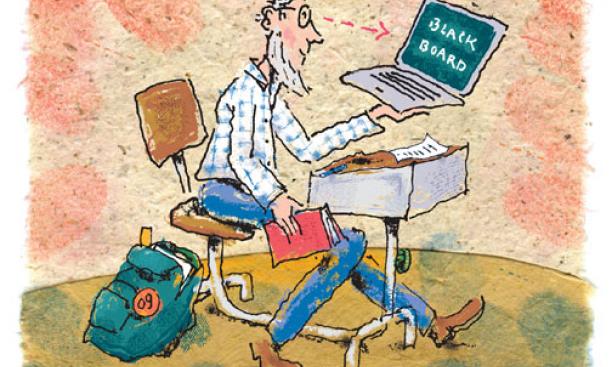

John Armstrong ’67 recently retired from a career in investment-firm information systems. He has an M.B.A. from Harvard University.
It’s Friday night. Scribbled notes are taped to both printers on the main floor of Firestone Library: “Out of order. OIT Called.” What to do? I am desperate to get a head start on the slew of reading assigned for the week ahead. Books are mostly passé at Princeton these days, replaced by boatloads of reserve reading material — excerpts from anthologies, scholarly journals, and the like. It’s all in digital format, posted on Blackboard, the academic software Princeton uses for its “eReserve” capability. But my 60-something eyes prefer hard copies, so I need to print those PDF versions. I trot down to B Floor in search of another printer.
B Floor! It’s the same place I hung out 42 years ago writing a rather ordinary thesis for the English department. Now I am back on campus in Princeton’s Program in Teacher Preparation, reinventing myself as a public school math teacher. In the fall I lived out the fantasy — some might say the nightmare — of taking (for credit) a full load of undergraduate courses: humanities, math, psychology, and teacher training, complete with all the papers, exams, and reading required of every Princeton student. I am one of several dozen prospective teachers — mostly undergraduates and the young alumni. And then there’s me, from the Class of ’67. This semester I am student-teaching in a seventh-grade math classroom, and taking a teacher-prep course that meets two nights each week.
As I neared the age of retirement, I faced a dilemma. I was not chief executive of a business, a groundbreaking neurosurgeon, or a renowned journalist. I was not among the minority who had reached the very top of the pyramid. Yet I was lucky enough to have choices: I could begin a life of leisure on the golf course or travel around the world. I could soldier on at work in the computing field. I could become a professional volunteer. Or I could try something new and different — something that had personal value, or “meaning,” as they say.
So I tiptoed back into the classroom. Soon after graduating from Princeton I had taught English in a prep school, so I tried substituting in the local high school. But I never much enjoyed Moby Dick, and high school students can be a surly bunch. Then, one morning the phone rang: Would I cover a sixth-grade math class? Sixth grade! Math! Talent for math had carried me through my work much of my adult life. But I had not been in a sixth-grade classroom since I was 12. “Sure,” I answered. I never looked back. Over the next few months I subbed in math, English, science, Spanish, social studies, and computer science in the middle school. On days they didn’t call me in, I missed the kids.
To become certified as a teacher, I had to return to college. I found the home page of Princeton’s teacher-preparation program, which “prepares undergraduates, graduate students, and alumni to become certified teachers at the elementary or secondary level.” A phone call, then a meeting, an application form, letters of recommendation — and by June, I was enrolled.
In addition to education classes, the teacher-prep office calculated that I needed more math. Three-hundred-level Princeton math courses were over my head, but I found a relevant course offered by nearby Rider University. New Jersey also requires a non-Western literature course, so I signed up for a class in early East Asian literature. Including educational psychology and an eight-credit teacher-prep class with labs and field observations, I took 20 credits in the fall, the equivalent of five courses.
Would I make it? The advice of the many Princetonians among my family and friends rang in my ears: “Don’t mess up!” Today’s Princeton students are brighter and more focused than we were in the ’60s. Workloads are larger than in our day. My solution was to work long hours and never let work pile up. Friday nights were not party nights for me — I was alone in Firestone. Over Christmas break, I worked on four papers.
I also worried about fitting in. Students learn from each other. How would I contribute and not sound like a graying, bearded know-it-all? To my surprise, no professor or fellow student ever said: “So what’s the perspective of an older fellow like you?” When I disclosed my Princeton ’67 vintage at the end of the fall semester, a fellow student told me after class: “Gee, I never realized you were that old!”
Sometimes, of course, I did have a different perspective. Some students in my class said they saw no need for an “encyclopedic” knowledge of science; in response, I offered the perspective of a literature-major-turned-technologist who had witnessed the destructive power of ignorance. Maybe I did come across sometimes as a bearded know-it-all!
I befriended many fellow students, but they were not especially curious about me. Today’s undergraduates are worldly-wise, hard to shock or surprise. They love Princeton, but in conversations and precepts I also detected a restless urge to finish up and move on. They are avid doers, taught by helicopter parents (like me) to lead frenetic lives filled with studying, sports, extracurricular activities, and serious socializing. There is so much to do.
Sometimes I have felt like a community of one. Finding company was a challenge, as my weekdays were spent in classes and school observations, and my weekends were devoted to homework. My wife, Rebecca Wilson ’74, took to visiting from Connecticut at the Nassau Club, where I lived in the fall, and the on-campus Episcopal Church provided a lifeline for the spirit.
